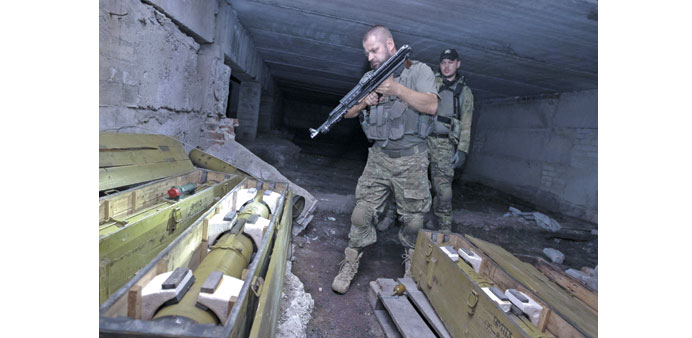Members of Ukrainian police special task force ‘Kiev-1’ inspect weapons hidden by pro-Russian separatists in the basement of an unfinished house in Sloviansk yesterday. Russian troops are strengthening their positions in eastern Ukraine and using aid shipments to smuggle in arms and other supplies to separatist forces, Kiev’s military said.
AFP
Russia has declared Nato a major “threat” after the Western military alliance announced plans to reinforce defences in eastern Europe because of the Kremlin’s perceived stoking of war in Ukraine.
Moscow’s surprise declaration of a shift in its military doctrine came just ahead of a Nato summit in Wales tomorrow at which beleaguered Ukrainian President Petro Poroshenko will lobby US President Barack Obama for military support.
Obama will deliver a message of firm Nato support for its newest members from the former Soviet empire when he visits the tiny Baltic state of Estonia today.
The Russian national security council’s deputy secretary Mikhail Popov said that Nato’s plan for new fast-response units in eastern Europe was “evidence of the desire of US and Nato leaders to continue their policy of aggravating tensions with Russia”.
Popov said that he had “no doubt that the question of the approach of Nato members’ military infrastructure to our border” will be taken into consideration as “one of the foreign military threats to Russia” when the country’s defence doctrine is updated later this year.
Popov added that Russia’s 2010 military doctrine – a document that already permits the use of nuclear weapons in case of grave national danger – would focus more on overcoming Nato and its new European anti-missile defence system.
Yesterday Ukraine reported losing 15 more soldiers in the latest day of clashes with Russian-backed insurgents whose ongoing offensive threatens to stamp Moscow’s permanent hold on the eastern half of the ex-Soviet state.
The Ukrainian president’s appeal for European military assistance in the face of Russia’s alleged dispatch of crack troops into the conflict zone was dismissed at a meeting of EU leaders in Brussels at the weekend.
But Nato chief Anders Fogh Rasmussen said that the 28-nation alliance would endorse the establishment of a force of “several thousand troops” that could be deployed within “very few days” to meet any perceived Russian military movements in eastern Europe.
The New York Times reported the rapid-response unit would be supported by new Nato members such as Poland that were once Soviet satellites but now view Russian President Vladimir Putin with fear and mistrust.
Yet the plan would be of no immediate help to Ukraine’s government because since the country is not a member of Nato – a point stressed by Obama in his rejection of calls to involve the US military.
London’s Royal Institute for International analyst Affairs Robin Niblett added that “any type of overt military intervention (by Nato) is highly unlikely” because many members – including Russian trade partners Italy and Austria – do not see a sufficient threat in the Kremlin.
Poroshenko convened his national security and defence council late on Monday to discuss mounting setbacks in the mostly Russian-speaking regions in which the army had until recently put rebels on the back foot.
“The situation is difficult but the Ukrainian fighting spirit is stronger than that of the occupants,” Poroshenko said in reference to more than 1,000 Russian soldiers that Nato believes the Kremlin has sent across the Ukrainian border in recent days.
Moscow on Monday again denied either sending or planning to deploy troops into eastern Ukraine.
Officials dismiss allegations that Russian intervention is being used to carve a land corridor from Russia to the Crimean peninsula – another Ukrainian region which Russia took over in March.
Separatist commanders have termed Russian soldiers in their ranks as having come while off-duty or on vacation.
That admission prompted Ukrainian Prime Minister Arseniy Yatsenyuk to declared that Kiev would abandon its non-aligned status and seek Nato membership in the coming years – a development Russia would intensely oppose.
UN Secretary General Ban Ki-moon responded to the Cold War-style rhetoric by cautioning “there is no military solution” and calling for “political dialogue”.
An inconclusive round of European-mediated talks between Kiev and Moscow envoys and a few separatist leaders concluded in Minsk on Monday with only a tentative agreement to meet again on Friday.
Putin on Sunday hardened Russia’s position of demanding only talks on autonomy for the region by noting that Kiev would have to discuss “statehood” for the two rebel eastern district.
Kremlin foreign policy adviser Yury Ushakov also confirmed that Putin had recently told European Commission chief Jose Manuel Barroso in private of Russia’s ability to capture Kiev in two weeks if it wished.
But Ushakov said the comment “had been taken out of context and had a completely different meaning” (see sidebar).

